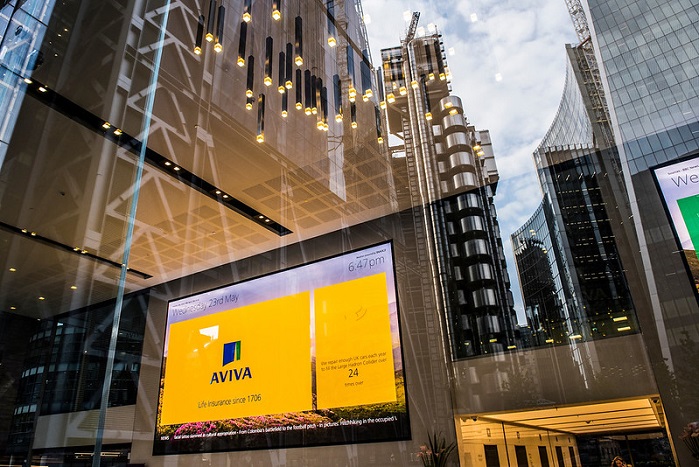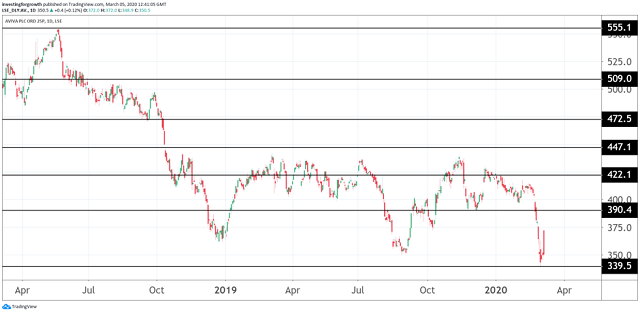Aviva: 9% dividend yield compensates for turnaround risk
A positive reaction to results quickly fizzled out, leaving this income stock near multi-year lows.
5th March 2020 12:52
by Graeme Evans from interactive investor
A positive reaction to results quickly fizzled out, leaving this income stock near multi-year lows.

A modest 3% dividend hike was a sign of the times at Aviva (LSE:AV.) today as annual results from the FTSE 100 index insurer highlighted a new set of priorities under CEO Maurice Tulloch.
One of his first moves last year was to rip up Aviva's dividend policy, following a number of years in which shareholders had feasted on double-digit percentage increases. Today's total pay-out of 30.9p is part of a new progressive policy that should give Tulloch the flexibility to implement his agenda, including a drive to reduce debt by £1.5 billion by 2021/22.
His ultimate goal for three years’ time is to achieve a sustainable 12% return on equity, which will underpin the company's dividend over the long-term. Tulloch said today's 2019 results showed the group was on the right path, but with work to do on cost reductions, driving organic business growth and on switching capital allocation to higher return segments.
- Income investors warned to expect poor dividend growth in 2020
- Nick Train interview: COMING SOON. Click here to subscribe
- Take control of your retirement planning with our award-winning, low-cost Self-Invested Personal Pension (SIPP)
Investors initially welcomed the results, with operating profits up 6% to a record £3.2 billion and a 206% solvency cover ratio particularly strong. The dividend, which will be paid at the start of June, was also in line with those revised expectations.
But having surged as high as 370p in early trading, the stock was later back near to where it was at the peak of the coronavirus sell-off at the end of last week.
In terms of dealing with the outbreak, the group pointed out that it boasted a robust capital and liquidity position but that it was still taking action to reduce its exposure to potential economic shocks.

Source: TradingView Past performance is not a guide to future performance
As well as the prospect of lower interest rates, the group is being buffeted by the British weather. The group's general insurance division has been hit by storms Ciara and Dennis, which at £70 million have cost about £20 million more than usual for this point of the year.
Other concerns for investors include today's warning that the task of rebuilding profitability at Aviva Investors and in UK protection is expected to take time. This is offset by in-line growth expectations for UK savings, UK annuities and in general insurance.
The turnaround strategy has so far failed to fire up investors, with Aviva shares prior to the recent market sell-off trading lower than a year ago. They are also currently cheaper than the 2013 low seen in late 2018 following the departure of previous boss Mark Wilson.
The resulting 9% dividend yield means there's some compensation for investors prepared to wait for Tulloch's strategy to complete. And Aviva is not alone in the insurance sector, given the high yields on offer at the likes of Legal & General (LSE:LGEN) and Direct Line (LSE:DLG).
- Job Curtis: Stocks I’m buying for City of London Investment Trust
- Income hunters can find great funds on ii’s Super 60 recommended list of investments
Some of the enthusiasm of income-seeking investors, however, will have be tempered by the scrapping of the old dividend policy based on 50% of operating EPS. Dividends are now expected to grow more in line with this EPS figure, which rose today 8% to 60.5p.
Analysts at Morgan Stanley described the yield as “harsh”, particularly when strong capital generation had kept the solvency ratio at 196% at the end of a turbulent February. They have a price target of 460p, whereas counterparts at UBS have a price target of 490p.
These articles are provided for information purposes only. Occasionally, an opinion about whether to buy or sell a specific investment may be provided by third parties. The content is not intended to be a personal recommendation to buy or sell any financial instrument or product, or to adopt any investment strategy as it is not provided based on an assessment of your investing knowledge and experience, your financial situation or your investment objectives. The value of your investments, and the income derived from them, may go down as well as up. You may not get back all the money that you invest. The investments referred to in this article may not be suitable for all investors, and if in doubt, an investor should seek advice from a qualified investment adviser.
Full performance can be found on the company or index summary page on the interactive investor website. Simply click on the company's or index name highlighted in the article.